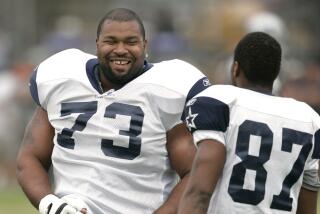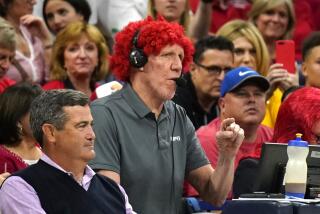His Actions Spoke Volumes Off the Field as Well as On
- Share via
He rushed the football farther than anyone else in history, yet all you can think about today is how Walter Payton died waiting.
Waiting, initially, for a liver transplant.
Waiting, then, for the cure for an incurable disease that made the transplant impossible.
You think, Superman, helpless, waiting?
And then it hits you with the surprise of a heart condition that fells a giant, with the suddenness of a malfunctioning airplane that forever quiets a flamboyant golfer.
There are no supermen.
The number of recent surprise deaths in the sports world reminds us that we spend an awful lot of time cheering these men and women for something they do not have.
We cheer them for being larger than life.
We cheer them for their immortality.
Then we wake up one morning to discover that among all the people who cheered Walter Payton, none of them could give him a liver or fix the one he had.
We realize that, in the end, he was no different from the guy in the next house, the guy in the next hospital room, the guy in the mirror.
We don’t think about this when we are adoring them, writing about them, subscribing traits to these athletes that even the gods of ancient civilizations did not possess.
Death doesn’t surprise us with other celebrities, particularly entertainers and politicians, as it does with athletes.
Other celebrities, whether in talk-show interviews or on campaign trails, often attempt to appear human. An athlete’s entire life, on the other hand, is devoted to proving otherwise.
Payton’s humanly tragic death, like others before it, should make us think again.
Just because you are preparing for the fourth game of the World Series doesn’t mean you won’t be awakened in the middle of the night, the caller telling you that your father has died.
Anyone who witnessed the just-completed New York Yankees’ sweep of the Atlanta Braves knows that none of it was more compelling than tearful Yankee Paul O’Neill playing in the clinching game just hours after his father’s death.
Just because you were once the youngest winning driver in CART history doesn’t mean that, two years later, your race car won’t kill you, as one did Greg Moore on Sunday in Fontana.
Just because you are at the peak of your career, as golfer Payne Stewart was, doesn’t mean that the cheering won’t end tomorrow.
Just because nobody ever thought you would die, as with Wilt Chamberlain, doesn’t mean you won’t.
So today, let us not wax poetic about Payton the athlete.
Let us refrain from soliloquies about Payton in the snow at Soldier Field, or Payton on the ice at Green Bay, or Payton running hard against the legend of Jim Brown.
Let us judge him in the only thing by which all of us will be judged.
Not by his appearance as a superhuman, but by his reality as a human.
Was Walter Payton a good, decent man?
By all accounts, he was a great one.
Let us write not about his 125 touchdowns, but what he did afterward.
He never spiked the ball. He always handed it to an offensive lineman to spike.
Let us write about the day he broke Jim Brown’s all-time rushing record--not what he did, but how he did it.
It was at the end of a simple six-yard run at the start of the second half of a nondescript game between the Chicago Bears and the New Orleans Saints.
Payton then jumped up and headed back to the huddle to continue the game, which would be a little like Mark McGwire disappearing into the dugout to get his glove after hitting the home run to surpass Roger Maris.
“We had momentum,” Payton said at the time.
Momentum? The Bears were on their own 27-yard line.
For him, apparently, simply living was momentum.
There is a running back who is close to breaking Payton’s record, a guy by the name of Barry Sanders.
Let us remember that, unlike Sanders, Payton never walked away from a bad team or quit on a bad situation.
Some today will talk about Payton’s wondrous leaps into the end zone.
I would prefer to remember the wondrous leaps of faith he took each year by playing on Chicago Bear teams led by quarterbacks like Gary Huff and Bob Avellini, with receivers like James Scott and Dennis McKinnon.
Even when Walter Payton finally made it to a Super Bowl after the 1985 season, he was seemingly drowned out by the chorus.
He gained only 61 yards in that game. And when the Bears were poised on the one-yard line for a meaningless touchdown late in an eventual 46-10 rout of the New England Patriots, Coach Mike Ditka inexplicably refused to give Payton the ball.
Instead, Ditka wanted to make it all about Ditka, and ordered defensive tackle William “the Refrigerator” Perry to carry it the final yard, showing everybody the smartness and cuteness of the coach.
But it didn’t work.
Payton didn’t score, but nobody was bigger in that game than he was.
And nobody was bigger two seasons later, in his final year with the Bears, when Payton quietly agreed to switch to fullback to block for a younger and stronger Neal Anderson.
And, finally, at his Hall of Fame induction in 1993, nobody was bigger than the man who had his young son, Jarrett, introduce him.
At this, the elder Payton cried, as any proud father would cry, and that was the Walter Payton most worth applauding.
This season, as a worried freshman quarterback at the University of Miami, Jarrett switched to running back merely to honor his father.
Which gave Walter Payton the ultimate stardom that had nothing to do with statistics. Which, we have been reminded recently, is the only stardom that matters.
The worst thing that could happen to the memory of perhaps football’s greatest running back is for you to believe he is the person running through all those defenders on all those video clips.
Just as we all believed Payne Stewart was the man in the knickers, or Wilt Chamberlain was the man in the headband.
None of those runs helped Walter Payton get his liver or cure his disease. None of that made him immortal.
Superman? No, only man.
We should remember Walter Payton today because, in his case, that was enough.
Bill Plaschke can be reached at his e-mail address: bill.plaschke@latimes.com.
(BEGIN TEXT OF INFOBOX / INFOGRAPHIC)
BY THE NUMBERS
16,726: Rushing yards, 1st all-time
110: Rushing touchdowns
275: Rushing yards vs. Minnesota on Nov. 20, 1977 (NFL record for one game)
77: Games with at least 100 rushing yards (NFL record)
10: Seasons with at least 1,000 rushing yards (NFL record)
1: super Bowl title (1985 Chicago Bears)
4.36: Regular-season average, yards per carry
3.51: Postseason average, yards per carry
More to Read
Go beyond the scoreboard
Get the latest on L.A.'s teams in the daily Sports Report newsletter.
You may occasionally receive promotional content from the Los Angeles Times.











